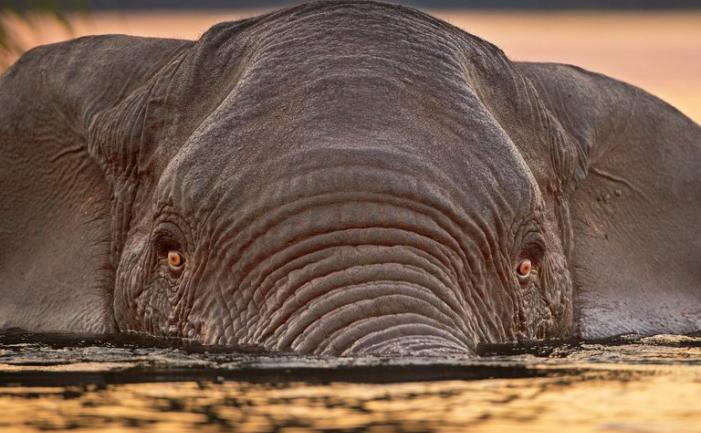
Elephants Are Very Scared of Bees. That Could Save Their Lives.

Elephants are afraid of bees. Let that sink in for a second. The largest animal on land is so terrified of a tiny insect that it will flap its ears, stir up dust and make noises when it hears the buzz of a beehive.
Of course a bee’s stinger can’t penetrate the thick hide of an elephant. But when bees swarm — and African bees swarm aggressively — hundreds of bees might sting an elephant in its most sensitive areas, the trunk, mouth and eyes. And they hurt.
The threat of bees is so intensely felt by elephants that conservationists are using it to help prevent the kinds of conflict that put the behemoths at risk. The endangered animals have sometimes been shot by farmers trying to save their crops from elephants foraging at night for late-night snacks, or by poachers allowed access to help guard the fields.
Now there’s a weapon — and a mutually beneficial one — in the arsenal. In recent years, researchers and advocates have persuaded farmers to use the elephant’s fear of bees as a potential fence line to protect crops. By stringing beehives every 20 meters — alternating with fake hives — a team of researchers in Africa has shown that they can keep 80 percent of elephants away from farmland.

The Asian elephants behaved a little differently: They didn’t shake their heads or shower themselves with dust, but they did make noises, shying away from the bees and touching one another’s trunks or putting a trunk into another’s mouth, perhaps as a sign of reassurance or comfort. The Asian elephants also sometimes slapped their trunks against the ground in fear.
It’s not clear whether Asian elephants react differently to bees because the bees in Asia are less aggressive. Or maybe the elephants simply have different behavioral responses, the way people from one culture might laugh if they’re nervous and those from another might fidget or talk fast, said John Poulsen, a tropical ecologist and assistant professor at Duke University, who has helped conduct similar elephant-bee research.
In Africa, Save the Elephants, a nonprofit conservationist group, builds wire and beehive fences at a cost of about $1,000 for a one-acre farm — roughly one-fifth the cost of an electrified fence, said Dr. King, who also heads the human-elephant coexistence program for the charity. The farm gets protection against elephants and a modest new source of income from a twice-a-year honey harvest.
The beehives have to be strung on a wire sturdy enough to hold them up, but not so sturdy that the hives can’t sway in the breeze. Dr. King learned early on that a swinging hive causes the bees to flee, becoming more active and scaring the elephants.
Image

Elephants are so smart that if they don’t have the “negative conditioning” of a few stings — for instance, if researchers just play a recording of buzzing bees — they quickly learn that the threat isn’t real, Dr. King said.
The fences also serve as a psychological barrier for the farmers, making them think twice before slashing and burning more forest for farmland, she said.
So far, the beehive fences are being used or tested in 11 countries in Africa and four in Asia, and the farmers seem to appreciate the approach, with more than 200 volunteering to participate in the last year. “When I first started, I had to really persuade people to try it,” Dr. King said in a Skype call from Kenya. “They thought I was absolutely insane. Then they thought, well, she’s giving us free beehives, so whatever. Now people are queuing up to do it.”
Dr. King acknowledged that a fear of bees won’t be enough to keep the elephants away. When the fields are filled with bounty, for instance, farmers may need to scare off elephants by taking advantage of their other fears, like the sound of barking dogs or shots fired into the air.
Steeve Ngama, a doctoral candidate with the Université de Liège in Belgium, who has done similar research, said via email that bee hives are a good idea. Somehow, though, elephants may outsmart the bees and figure out a workaround.
“If elephants have stakes, for instance, accessing succulent fruits or crops, they will take time to learn how to overcome the method,” he said. “Most of the time they succeed; especially when the reward is worth the risk.”
Source : https://www.nytimes.com/2018/01/26/science/bees-elephants-.html




































